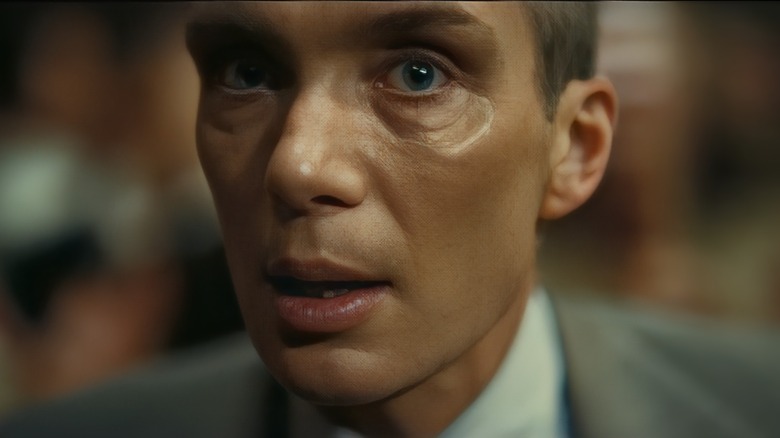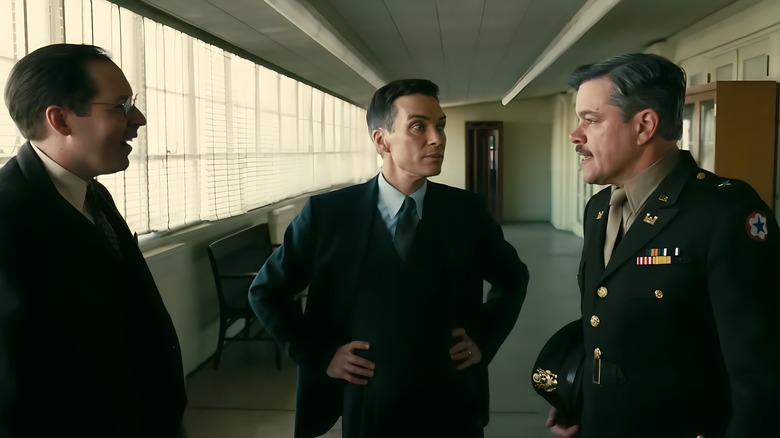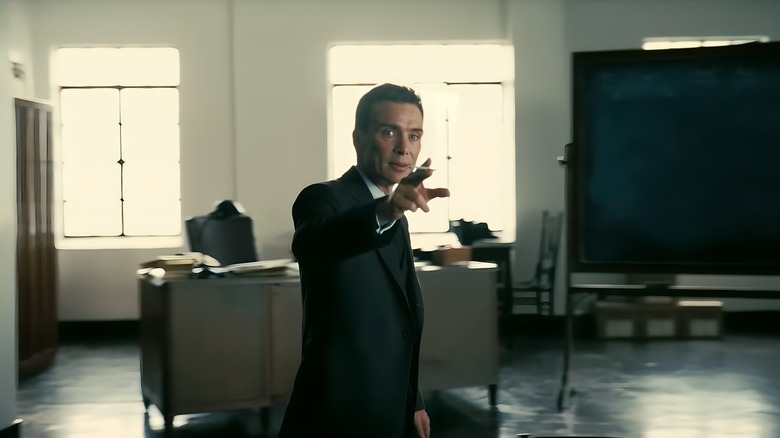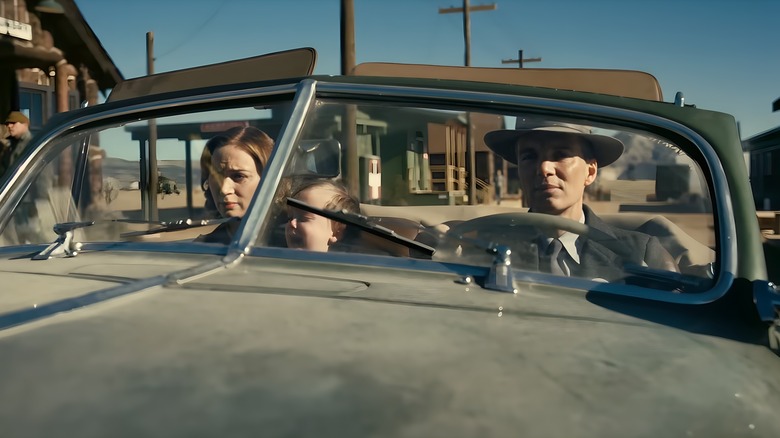Why Christopher Nolan Sees Oppenheimer As A Cinematic Rorschach Test
You didn't think the latest Christopher Nolan film was going to be straightforward, did you? The director has always had a penchant for interrogating complex and grand ideas, often delving into philosophical pontification that can sometimes be a detriment to his films, but mostly makes them infinitely fascinating. He might have confused everyone beyond the point of return with "Tenet" and its convoluted sci-fi plot, but with "Oppenheimer," Nolan has taken on a different kind of complexity. Namely, he's tackled the moral issues surrounding the creation of the nuclear bomb, all within the framework of a thriller biopic that's shaping up to be one of the best movies of the year.
As /Film's own Chris Evangelista wrote in his review, the resulting film is one that "asks tough questions and then dares to not give us any easy answers," ultimately representing "a conflicting movie with an unknowable core." The film's narrative, based on Kai Bird and Martin J. Sherwin's biography of J. Robert Oppenheimer, "American Prometheus," is designed to make audiences reflect on the creation of the atomic bomb — a topic which yields very little in the way of concrete answers. That alone seems to have been enough to interest Nolan in making a film on the subject.
With "Oppenheimer," the esteemed filmmaker has aimed to do the unthinkable in an era of supposedly shortening attention spans by delivering something that has the capacity to make audiences reflect, and there's no better way to provoke thought than by eschewing answers to compelling questions. In that way, Nolan has created what he sees as a kind of cinematic Rorschach test for his audience.
'A very conflicted set of feelings'
Christopher Nolan's whole point of view with the cautionary tale that is "Oppenheimer" is to leave the hard work for his audience. It's not as easy as saying "the world would be better off without Oppenheimer's invention." If it were, people might be coming out of Nolan's film knowing exactly what they think, and who would want to come away from art with zero questions? Certainly not anyone that values cinema as an art form, and Nolan, as a connoisseur of cinema himself, knows this.
So while you can say the world might be better off without nuclear weapons in general, the socio-political climate in the mid-20th Century made their creation almost a necessity — at least in the minds of the political leadership, military members, and scientists that were working on it at the time. As Nolan put it in a recent interview, "To them, atomic energy was a simple fact of life."
That makes the subject matter of "Oppenheimer" and the themes it encapsulates fairly elusive in terms of what they tell us about history and ourselves. For Nolan, who spoke to The Bulletin as part of his press tour for the film, this essentially means his three-hour epic is a "Rorschach test that prompts a variety of responses." The director continued:
"There are people who come out of the film literally speechless. They can't talk; they're upset in some way. They've enjoyed the film, but they don't understand why they've enjoyed it. It's a very conflicted set of feelings that the film gives you. And that was the goal, that peculiar mixture of emotions."
An emotional response
Expanding on his view of "Oppenheimer" as a kind of cinematic Rorschach test, Christopher Nolan explained how he felt the man himself to be much the same. In the director's words, "[J. Robert Oppenheimer] is the ultimate Rorschach test. I believe you see in the Oppenheimer story all that is great and all that is terrible about America's uniquely modern power in the world."
If there's anything that characterizes Christopher Nolan's films, it may be the idea that he doesn't like to present simple answers. Like any good artist, the filmmaker is attracted to nuance, complexity, and the search for answers rather than their discovery. That goes all the way back to the narrative complexity of "Memento" and even Nolan's first film, "Following," wherein burglary isn't just something thrilling to depict, but something to be mined for moral complexity. As the thief character, Cobb (Alex Haw), says when talking about stealing his victim's property, "You take it away, and show them what they had."
With "Oppenheimer," Nolan has once again chosen a topic — perhaps the topic — that allows him to elicit mixed feelings and raise lingering questions among his audience. The director elaborated on why this was so attractive to him in the Bulletin interview, citing the primacy of an "emotional response" when designing a film:
"This is a complicated form of engagement that we're after. And we're looking for an extremity of response, an emotional response that's not necessarily clear-cut. But the film does seem to resonate with people. It does seem to mean something to people. And I think, as a filmmaker, that's all you can hope for."
Nolan at his best
"Tenet" might be the best example of Christopher Nolan getting too caught up in his own cleverness, but there are other examples of his films veering hard into philosophical pontification. Even in the excellent "The Dark Knight," the whole boat sequence, wherein Heath Ledger's Joker gives a ship full of civilians the detonator to a bomb placed on another craft full of prisoners and vice versa, there are some lines that read like extracts from an academic paper on moral philosophy.
When Nolan is at his best, he's mixing that interest in deep and complex questions with emotional weight. There's a reason so many people consider "Interstellar" to be his best film, because it balances concepts as complicated as the event horizon of a black hole with a narrative based on familial bonds and a father's love for his daughter.
With "Oppenheimer," it's nice to hear Nolan talking about wanting to elicit an "emotional response," precisely because it taps into what his best work has represented. In fact, it taps into what makes any work of art great: Making people feel something.



